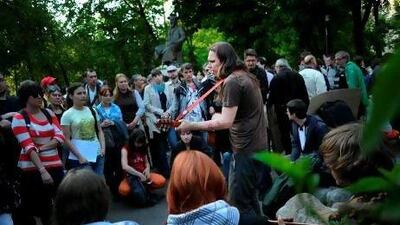In Russia, a new wave of protest has erupted. While activists demonstrated before this year's elections, the country's musicians have adopted song to express their dissent.
"It's the newest art form in Russia today," according to Vasily Shumov, a well-known Russian musician who is also the founder of the 1980s band Center. "It's activist art."
Sitting in the basement cafe at the Central House of Writers, an old Soviet building in central Moscow originally built to accommodate state-approved writers, Shumov, 52, talks with typical rock-star attitude.
Shumov started writing "protest music" last summer and describes his new album, I Feel Good Part 1, as "a conceptual release about people who feel good under this regime and conform to the corrupt system."
Government Bulldozer is one of the album's feature songs and its video has generated thousands of hits on YouTube, although local radio stations have been reluctant to put its anti-Putin message on their playlists: "These are not threats," Shumov states in the song, "What if the government bulldozer goes over you, I'm not trying to scare you, It's just a motivation to think in the right way."
Meanwhile, the all-women punk band Pussy Riot staged impromptu performances in Moscow's Red Square and Cathedral of Christ the Saviour during election season. The latter show led to the arrest of two band members. Inspired by Riot Grrrl, an American underground feminist punk rock movement, the group's songs include Holy Mother and Send Putin Packing.
And while many Russians don't approve of their act, they identify with the sentiments expressed in their lyrics.
"What they're singing is true," says Lillie Mazitova, a journalism student at Moscow State University.
Although Pussy Riot have gained global attention for their protest performances, their music has garnered little serious interest.
Artem Langenburg, a music critic and culture expert, describes their sound as "standard hardcore punk and dirt low-fi. I would consider them as operating in between political activism and street art, using guitars and provocative slogans as their tools".
Shumov also views them "not as a band but more like a performance group".
Activism through art or music has a rich tradition in Russia. During the Soviet-era, underground folk singer-songwriters (known as bards), wrote songs that expressed their frustration with the communist system. Bulat Okudzhava, Aleksandr Galich and Vladimir Vysotsky became prominent figures in Russia's "guitar poetry", which emerged in the 1950s.
While the "mass song" in communist society exemplified the Soviet way of life and was approved by the government, "guitar poetry", according to Gerald Stanton Smith, a British specialist in Russian literature, was on the opposite end of the spectrum.
In his book, Songs to Seven Strings: Russian Guitar Poetry and Soviet Mass Song, Stanton writes that "guitar poetry deals with forbidden subjects, opposes official themes, and attitudes, both implicitly and explicitly, uses language that is too frank and realistic to be tolerated in the media, and is a haven for irresponsible humour".
He says these artists turned away from the "mass song" and presented an alternative.
This musical mutiny proliferated in later decades, especially after the rise of bands like DDT, Televizor and also Center, who are still active.
In 2008, DDT performed in St Petersburg protesting about Dmitry Medvedev's election victory. Four years later, they are still singing the same note and in Moscow, their concert posters are plastered all over the city alongside western artists such as Sting and the Scorpions.
While rockers from yesteryear continue their fight against the perceived evils of the political situation, a new generation of rappers have added another layer to the soundtrack of protest.
Ivan Alexeyev, better known as Noize MC, is a young rapper notorious for his often provocative lyrics.
His songs not only protest the political situation, but also address corruption, drugs and violence.
One of his most recognised songs is Restore Justice (Mercedes S-666), which is about social injustice and comments on how the vice-president of Russia's second-biggest oil company Lukoil escaped without charges after a car crash that killed two women.
The 27-year-old hip-hop artist was arrested for mocking the police in his song Kuri Bambuk.
In his song Our Movement, Noize MC is even more vocal: "Politics - quite interesting occupation, Take the hill of money and diligently spend it, On corrupted meetings, fictitious parties, Here she is, Russian democracy, damn it!"
Protest music has also further expanded into activist art.
Tatiana Volkova, 34, who is working on a forthcoming exhibition, said music will be integral to articulating the socio-political changes in the country.
In September 2011, Volkova curated the Moscow international festival of activist arts at Artplay design centre. The event, which may eventually be staged annually, aimed to "bring together artists who came out of the studio, museums and galleries to make interventions in the streets and public spaces".
Earlier this year such a spirit of intervention brought two former Russian paratroopers out onto the streets to sing their protest song.
"You're like me, just a man, not a god," the duo sing in their YouTube video, which is their not very subtle way of expressing their discontent towards Putin. They also performed the song at an anti-government rally earlier this year alongside DDT frontman Yuri Shevchuk.
Despite censorship and state-controlled media, many political analysts, and also Russians, believe their country is opening up, and artists feel they have diverse platforms to sing freely and connect with their audience.
Critics like Lagenburg say "protest music is bit of a trend now". On the other hand, artists like Shumov think it is a brewing intellectual protest and claim that the protest music scene is "an early stage of activist music".
As creative artists, Shumov said, it is their responsibility to express freely, without any fear, and raise questions.
"I predict there will be more bands, more activist artists," Shumov said. "Someday it'll be mainstream."
Bibek Bhandari is a freelance journalist based in London.

